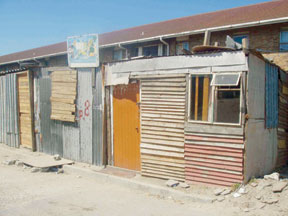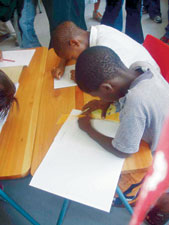Text and photos by Melissa Butler
Last semester, Wabash Professor of Political Science Melissa Butler travelled around the world aboard the Universe Explorer, teaching and learning as part of the ship’s Global Studies program. The following edited email was sent to a group of interested colleagues, friends, and alumni.
February 19, 2004
Cape Town, South Africa
Dear friends, We arrived in Cape Town last Sunday morning in time for church at the Cathedral. My afternoon was spent on a long walk around town and some exploration of the huge mall located right at the pier featuring just about every imaginable shop—from Armani to African craft stalls to bookstores stuffed with English books and magazines.
We arrived in Cape Town last Sunday morning in time for church at the Cathedral. My afternoon was spent on a long walk around town and some exploration of the huge mall located right at the pier featuring just about every imaginable shop—from Armani to African craft stalls to bookstores stuffed with English books and magazines.
The next day was about as stark a contrast as you could imagine. I went on an SAS tour of the Amy Biehl Foundation. Amy Biehl was a Stanford graduate student finishing up a Fulbright in Capetown in 1993. She was working to register voters in the townships when she was murdered in Guguletu township. In the U.S. media it was presented as a random act by a mob of boys.
Our guide, Ntebeko, had a very different take: the killing was a planned act of political violence, part of the Pan African Congress’s “one bullet, one settler” campaign. The PAC rejected negotiations over elections (which ultimately took place in 1994) and instead wanted to intensify the struggle. Killing police was not getting them anywhere, so they were looking for “soft targets” and determined to kill any white people who showed up in the area that day. Biehl had been warned by black African friends that the township was not safe for her, but she was intent on her mission to register voters.
After her death, her parents, Peter and Linda Biehl, came to South Africa and vowed to continue her work here. They established the Amy Biehl Foundation, a non-governmental organization that supports start-ups of various kinds of enterprises (a bakery, a golf driving range, to name two) in the townships and then spins them off when they become sustainable. The Foundation also has a very active HIV/AIDs campaign (Ntebeko heads up that part of the operation) and runs after-school programs and a kind of demonstration school.
"Biehl had been warned by black African friends that the township was not safe for her, but she was intent on her mission to register voters. After her death, her parents, Peter and Linda biehl, came to South Africa and vowed to continue her work here." | |
 After lunch we heard Ntebeko’s vivid description of the struggle against apartheid. We followed Amy Biehl’s trail through the township and saw the spot where she was killed. Four young men were convicted and sentenced to 18 years each for her killing. When the Truth and Reconciliation process started, they came before the tribunal, claimed that the murder of Amy Biehl had been a political act and part of the ongoing struggle, and were freed–-with the support of Linda and Peter Biehl!
After lunch we heard Ntebeko’s vivid description of the struggle against apartheid. We followed Amy Biehl’s trail through the township and saw the spot where she was killed. Four young men were convicted and sentenced to 18 years each for her killing. When the Truth and Reconciliation process started, they came before the tribunal, claimed that the murder of Amy Biehl had been a political act and part of the ongoing struggle, and were freed–-with the support of Linda and Peter Biehl!Melissa
Contact Professor Butler at: butlerm@wabash.edu